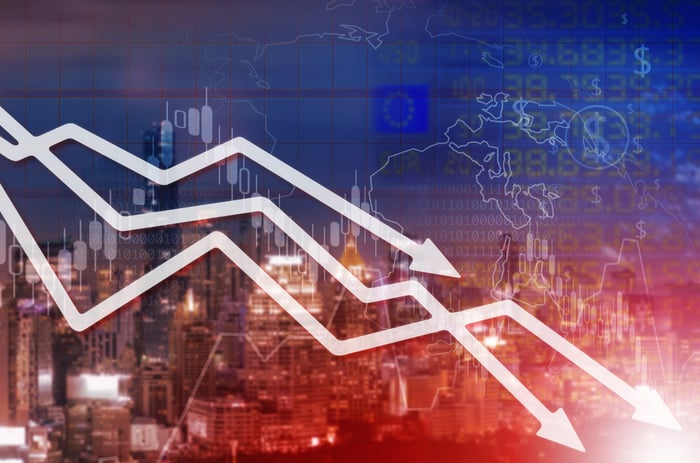What happened
Is this the market correction we've been waiting for? On Tuesday, the Nasdaq collapsed, falling nearly 4% in early trading before paring its losses to a decline of about 1.9% as of 10:30 a.m. EST, with tech investors worrying that their gains (200%, 300%, or more) over the past year might be imperiled by a recent rise in government bond rates.
Tech shares are tumbling on no particular news, but plenty of worry about what this might mean, with Appian (APPN 1.39%), for example, falling 2.2%; CrowdStrike Holdings (CRWD -0.42%) down 5.8%; and Zscaler (ZS 0.47%) off 8%.
Each of these names had roughly quadrupled in share price over the past year of pandemic, giving investors a lot to lose if the market turns south.

Image source: Getty Images.
So what
What could cause that to happen? Analysts warn of a "Tesla-Bitcoin-ARK Investment ... risk cluster" in which all sorts of companies and mutual funds are taking on all sorts of the same kinds of risk simultaneously -- such that if one thing goes wrong (Bitcoin falling 10% in a day, for example), the whole tangle threatens to fall apart. Bond rates are of particular concern, because the more money an investor can get from a so-called risk-free investment in bonds, the less likely that investor is going to be to want to invest in riskier stocks.
Saxo Bank's equity strategy head, Peter Garnry, summed up the worries nicely earlier this month, opining that "a correction in equities for whatever reasons, [whether because of] higher interest rates or prolonged COVID-19 lockdowns, could set in motion sell-offs across either biotechnology stocks or Tesla shares and cause performance to deteriorate which could [spook investors into selling] and then the feedback loop has started."
Now what
Now, the good news is that at least one of these reasons doesn't seem to be happening -- at least not immediately. In testimony before Congress this morning, Fed Chairman Jerome Powell said it will probably be "some time" before the Fed sees the economy as recovered enough that it can scale back the Fed's program of buying bonds. So long as it keeps buying, bond rates are likely to remain low, encouraging investors to continue taking greater risks in search of yield -- i.e., by buying stocks instead of bonds.
There are still other risks waiting in the wings, however, with Powell warning of "upward pressure on prices" for example, even as the economic recovery looks to have "slowed substantially," and senatorial questioners highlighting "warning signs that are certainly blinking yellow."
Today's wave of selling may subside -- but the risks are still out there.





